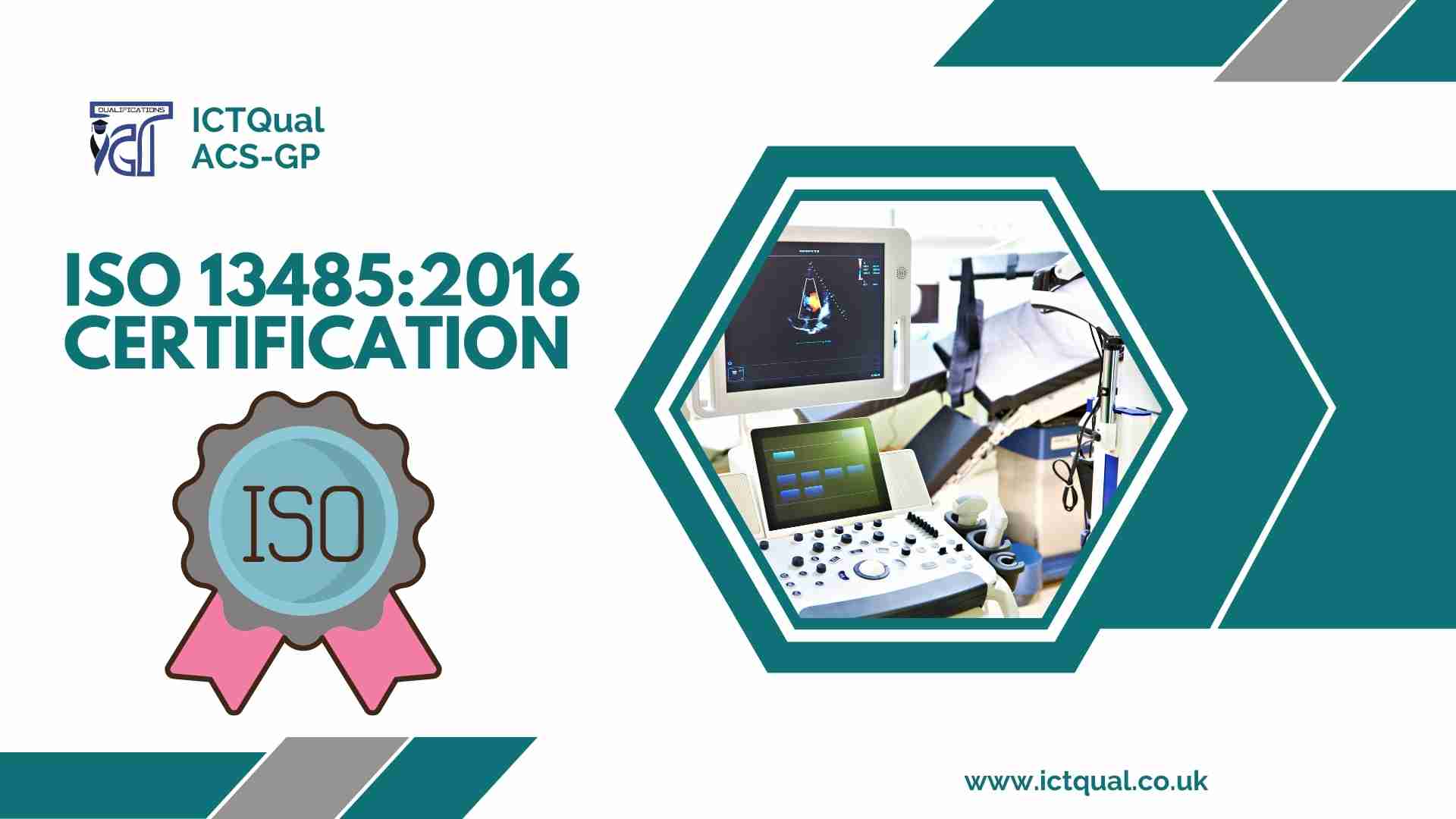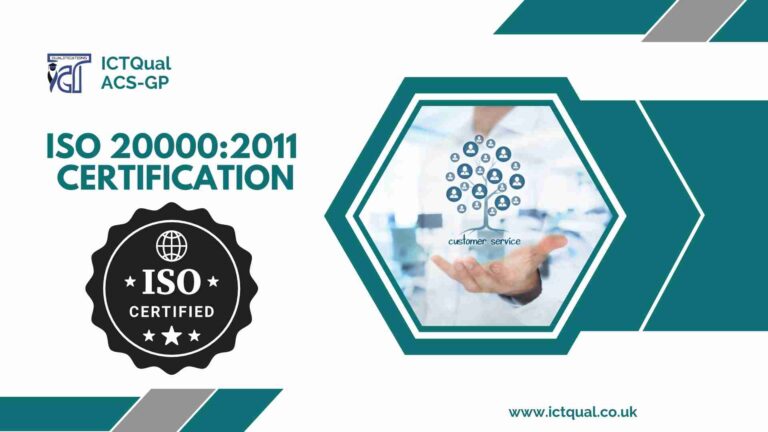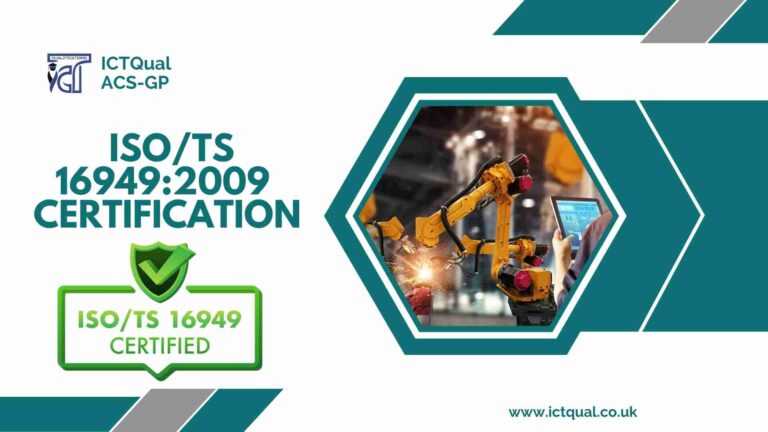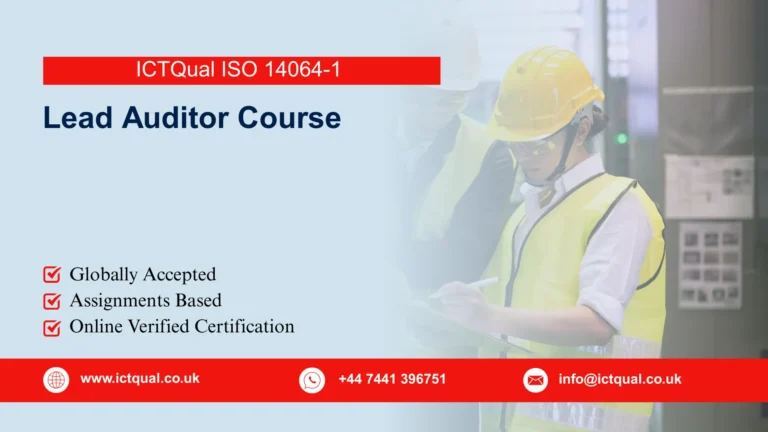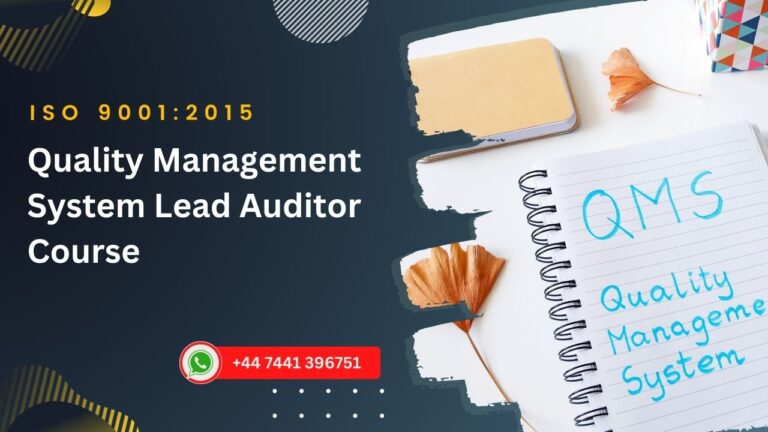Attention Medical Device Companies! Did you know that obtaining ISO 13485:2016 certification can give you a competitive edge in the market? ISO 13485:2016 is a globally recognized quality management system specifically designed for medical device manufacturers.
By obtaining this certification, you can demonstrate your commitment to quality, regulatory compliance, and customer satisfaction. ISO 13485:2016 certification can also improve product quality and safety, increase customer confidence, and provide access to new markets.
Don’t miss out on the opportunity to take your company to the next level. Contact us today to learn more about the ISO 13485:2016 certification process and how it can benefit your business.
ICTQual is Exclusive partner of ACS-GP and providing services for company registration with ISO in following ISO Standards
ISO 13485:2016 Certification
The ISO 13485:2016 standard is a globally recognized quality management system (QMS) specifically designed for medical device manufacturers. It outlines the requirements for the design, development, production, installation, and servicing of medical devices. The standard emphasizes the importance of risk management, regulatory compliance, and customer satisfaction in the medical device industry.
Obtaining ISO 13485:2016 certification demonstrates a company’s commitment to quality and regulatory compliance, which can improve its reputation and increase its competitive edge in the market. It is also a requirement for companies that wish to sell their medical devices in certain markets, such as the European Union and Canada.
To obtain ISO 13485:2016 certification, a company must undergo a thorough audit by an accredited certification body. The audit evaluates the company’s QMS and its compliance with the standard’s requirements. If the company meets the requirements, it will be issued an ISO 13485:2016 certificate, which is valid for three years.
The certification process can be complex and time-consuming, but it is worth the effort for companies in the medical device industry. ISO 13485:2016 certification is a valuable asset for companies in the medical device industry.
It demonstrates a commitment to quality, regulatory compliance, and customer satisfaction, which can improve a company’s reputation and increase its competitiveness in the market. Obtaining ISO 13485:2016 certification requires effort and resources, but the benefits can be significant for companies that invest in it.
Importance of ISO 13485:2016 Certification for Medical Device Manufacturers
ISO 13485:2016 certification is an internationally recognized quality management system (QMS) standard specifically designed for medical device manufacturers. It outlines the requirements for the design, development, production, installation, and servicing of medical devices. The standard emphasizes the importance of risk management, regulatory compliance, and customer satisfaction in the medical device industry.
Obtaining ISO 13485:2016 certification is crucial for medical device manufacturers, as it provides several benefits. In this article, we’ll explore the importance of ISO 13485:2016 certification for medical device manufacturers in more detail.
Compliance with Regulations
Medical device manufacturers must comply with numerous regulations and standards to ensure the safety and effectiveness of their products. ISO 13485:2016 is one of the most widely recognized standards in the industry, and compliance with this standard can help manufacturers meet regulatory requirements more easily.
Improved Product Quality and Safety
ISO 13485:2016 places a strong emphasis on risk management and regulatory compliance, which can help manufacturers produce safer and higher-quality products. By implementing a QMS that conforms to ISO 13485:2016, manufacturers can reduce the risk of product recalls, improve customer satisfaction, and increase patient safety.
Increased Customer Confidence
ISO 13485:2016 certification demonstrates a manufacturer’s commitment to quality and regulatory compliance. This can increase customer confidence and trust, leading to improved customer loyalty and increased sales.
Access to New Markets
ISO 13485:2016 certification is a requirement for medical device manufacturers that wish to sell their products in certain markets, such as the European Union and Canada. Certification can open up new business opportunities for manufacturers and increase their competitiveness in the market.
Improved Efficiency and Effectiveness
ISO 13485:2016 requires manufacturers to establish and maintain a QMS that is focused on continuous improvement. By implementing a QMS that conforms to ISO 13485:2016, manufacturers can become more efficient and effective in their operations. This can lead to cost savings, improved productivity, and increased profitability.
ISO 13485:2016 certification is crucial for medical device manufacturers. It demonstrates a commitment to quality, regulatory compliance, and customer satisfaction, which can improve a manufacturer’s reputation and increase its competitiveness in the market. By implementing a QMS that conforms to ISO 13485:2016, manufacturers can improve product quality and safety, increase customer confidence, access new markets, and become more efficient and effective in their operations.
Requirements for ISO 13485:2016 Certification
ISO 13485:2016 is a globally recognized quality management system standard specifically designed for medical device manufacturers. It outlines the requirements for the design, development, production, installation, and servicing of medical devices. To obtain ISO 13485:2016 certification, a company must undergo a thorough audit by an accredited certification body to ensure compliance with the standard’s requirements.
Here are some of the key requirements for ISO 13485:2016 certification:
Establishing a Quality Management System (QMS)
Companies seeking ISO 13485:2016 certification must establish a QMS that meets the standard’s requirements. The QMS should cover all aspects of the company’s operations, including design and development, purchasing, production, and servicing.
Document Control
ISO 13485:2016 requires companies to establish and maintain a document control system to ensure that all documents related to the QMS are controlled, including the standard’s policies and procedures, work instructions, and forms.
Risk Management
The standard emphasizes the importance of risk management in the medical device industry. Companies must establish a risk management process that identifies, evaluates, and controls risks associated with their products and processes.
Design and Development
ISO 13485:2016 requires companies to establish and maintain a design and development process that ensures the safety and effectiveness of their products. This includes verifying and validating the design, conducting risk assessments, and ensuring regulatory compliance.
Purchasing
Companies must establish and maintain a process for purchasing materials and services that are used in the production of their medical devices. The process should ensure that all purchased materials and services meet the company’s requirements and comply with applicable regulations.
Production and Servicing
The standard requires companies to establish and maintain a process for the production and servicing of their medical devices. This includes ensuring that all products meet specifications, are properly labeled and packaged, and are delivered in a timely manner.
Monitoring and Measurement
Companies must establish and maintain a process for monitoring and measuring their products and processes. This includes establishing performance indicators, conducting internal audits, and reviewing customer feedback.
In conclusion, obtaining ISO 13485:2016 certification requires companies to establish and maintain a QMS that meets the standard’s requirements. The certification process can be complex and time-consuming, but it demonstrates a commitment to quality, regulatory compliance, and customer satisfaction in the medical device industry. By meeting the requirements for ISO 13485:2016 certification, companies can improve their reputation and increase their competitiveness in the market.
Benefits of Obtaining ISO 13485:2016 Certification
ISO 13485:2016 is a globally recognized quality management system standard for medical device manufacturers. It outlines the requirements for the design, development, production, installation, and servicing of medical devices. Obtaining ISO 13485:2016 certification can provide several benefits to companies in the medical device industry.
Improved Product Quality and Safety
ISO 13485:2016 emphasizes risk management and regulatory compliance, which can help companies produce safer and higher-quality products. By adhering to the standard, companies can ensure that their products meet the necessary regulatory requirements and are safe for use by patients.
Increased Customer Confidence
ISO 13485:2016 certification demonstrates a company’s commitment to quality and regulatory compliance, which can increase customer confidence and trust. Customers are more likely to purchase products from companies that have obtained ISO 13485:2016 certification as it assures them that the products they are using are safe and of high quality.
Access to New Markets
ISO 13485:2016 certification is a requirement for companies that wish to sell their medical devices in certain markets, such as the European Union and Canada. Certification can open up new business opportunities for companies and allow them to expand their market reach.
Improved Efficiency and Effectiveness
ISO 13485:2016 requires companies to establish and maintain a QMS that is focused on continuous improvement. This can help companies become more efficient and effective in their operations, leading to improved productivity and profitability.
Competitive Edge
Obtaining ISO 13485:2016 certification can give companies a competitive edge in the market. It demonstrates a company’s commitment to quality and regulatory compliance, which can differentiate it from competitors and improve its reputation.
In conclusion, obtaining ISO 13485:2016 certification can provide several benefits to companies in the medical device industry. It can improve product quality and safety, increase customer confidence, provide access to new markets, improve efficiency and effectiveness, and give companies a competitive edge. While the certification process can be complex and time-consuming, the benefits make it a valuable investment for companies that wish to succeed in the medical device industry.
ISO 13485:2016 Certification Process
ISO 13485:2016 certification is a crucial step for medical device manufacturers who want to demonstrate their commitment to quality management and regulatory compliance. The certification process can be complex, but it is worth the effort for companies that wish to improve their reputation, access new markets, and increase customer confidence.
Here’s a comprehensive guide to the ISO 13485:2016 certification process:
Conduct a Gap Analysis
Before applying for ISO 13485:2016 certification, it’s essential to assess your company’s current quality management system (QMS) against the standard’s requirements. This process is called a gap analysis and helps identify areas that need improvement.
Develop an Implementation Plan
Based on the gap analysis results, develop an implementation plan that outlines the steps you need to take to meet the standard’s requirements. This plan should include timelines, responsibilities, and resources required for each step.
Train Your Team
ISO 13485:2016 requires all employees to be aware of their roles and responsibilities in maintaining a compliant QMS. Provide training to your team on the standard’s requirements, and ensure they understand how their work impacts the QMS.
Implement the QMS
Based on your implementation plan, start implementing the QMS. This includes developing policies, procedures, and work instructions that align with the standard’s requirements. Ensure that the QMS is integrated into your daily operations.
Conduct Internal Audits
Regular internal audits are essential to ensure your QMS meets the standard’s requirements. Conduct these audits to identify non-conformities and take corrective actions to address them.
Engage an Accredited Certification Body
When you’re confident that your QMS meets the standard’s requirements, engage an accredited certification body to conduct an external audit. The certification body will evaluate your QMS and issue a certificate if it meets the standard’s requirements.
Maintain the QMS
Once you’ve obtained ISO 13485:2016 certification, it’s essential to maintain the QMS’s compliance. This requires regular internal audits, management reviews, and continual improvement activities.
In conclusion, the ISO 13485:2016 certification process is an essential step for medical device manufacturers who want to improve their reputation, access new markets, and increase customer confidence. By following the steps outlined above, companies can develop a robust QMS that meets the standard’s requirements and demonstrate their commitment to quality management and regulatory compliance.
ISO 13485:2016 Certification, Valuable Asset for Medical Device Companies
In today’s highly competitive market, medical device companies are always looking for ways to gain an edge over their competitors. One way to achieve this is by obtaining ISO 13485:2016 certification, which is a globally recognized quality management system (QMS) specifically designed for medical device manufacturers.
ISO 13485:2016 certification demonstrates a company’s commitment to quality and regulatory compliance, which can improve its reputation and increase its competitiveness in the market. In this article, we will discuss the reasons why ISO 13485:2016 certification is a valuable asset for medical device companies.
Improved Product Quality and Safety
ISO 13485:2016 emphasizes risk management and regulatory compliance, which can help companies produce safer and higher-quality products. By implementing a QMS that meets the standard’s requirements, companies can ensure that their products are designed, developed, and manufactured in a way that minimizes the risk of harm to patients.
Increased Customer Confidence
ISO 13485:2016 certification demonstrates a company’s commitment to quality and regulatory compliance, which can increase customer confidence and trust. Customers are more likely to purchase products from a company that has obtained ISO 13485:2016 certification because it provides assurance that the company’s products are safe and effective.
Access to New Markets
ISO 13485:2016 certification is a requirement for companies that wish to sell their medical devices in certain markets, such as the European Union and Canada. Certification can open up new business opportunities for companies and help them expand their reach into new markets.
Improved Efficiency and Effectiveness
ISO 13485:2016 requires companies to establish and maintain a QMS that is focused on continuous improvement. This can help companies become more efficient and effective in their operations, which can result in cost savings and improved productivity.
Competitive Advantage
Obtaining ISO 13485:2016 certification can provide a competitive advantage for medical device companies. It demonstrates a commitment to quality and regulatory compliance, which can differentiate a company from its competitors and help it win new business.
In conclusion, ISO 13485:2016 certification is a valuable asset for medical device companies. It provides several benefits, including improved product quality and safety, increased customer confidence, access to new markets, improved efficiency and effectiveness, and a competitive advantage. Medical device companies that invest in ISO 13485:2016 certification can position themselves for long-term success in the market.
Conclusion
In conclusion, ISO 13485:2016 certification is a critical requirement for medical device companies that seek to demonstrate their commitment to quality, regulatory compliance, and customer satisfaction. Obtaining this certification can improve a company’s reputation, increase its competitive edge in the market, and provide access to new business opportunities. Although the certification process can be complex and time-consuming, the benefits are significant for companies that invest in it. It is important to note that maintaining ISO 13485:2016 certification requires ongoing effort and resources, but it is a worthwhile investment in a company’s success. By prioritizing quality and regulatory compliance, medical device companies can build a strong foundation for growth and innovation in an ever-evolving industry.

